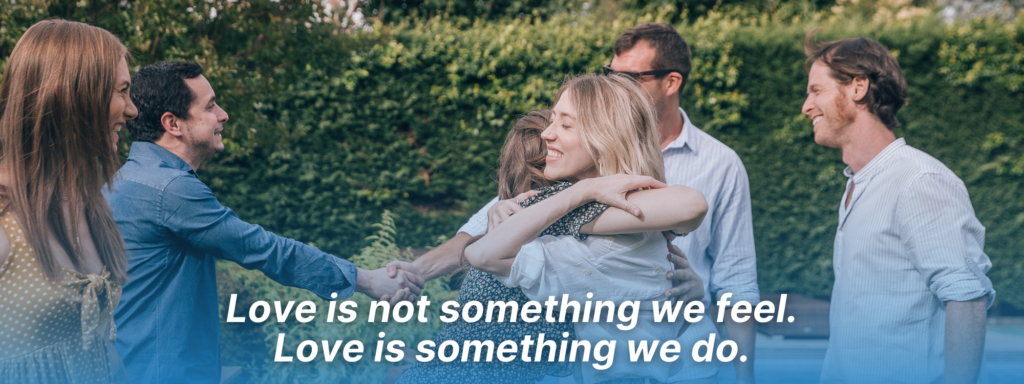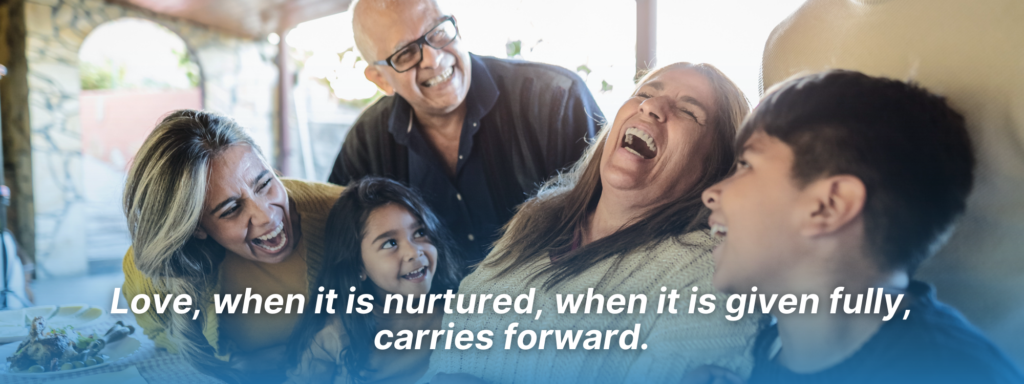The door swings open, and the world shifts.
For a moment, before stepping inside, the air is different—colder, thinner, as if the hush of existence itself presses against my back. But within that room, warmth spills out like a tide, wrapping itself around me before I even cross the threshold. My hand in Gillie’s hand.
‘A roomful of people I love’.
The phrase feels almost mythical, as though love—so often fragile, so often fleeting—was never meant to gather in such density, in such abundance.
The first wave is overwhelming. Laughter—layered, overlapping, interwoven melodies. The scent of something slow-cooked, steeped in care. Voices rising and falling, punctuated by knowing glances and unfinished sentences.
A face turns toward me—recognition, warmth, the unspoken contract of belonging. And yet, beneath the joy, something ancient stirs. A flicker of awareness, a pulse of tension in the ribs: This is fleeting.
Not morbidly so. Not with dread, but with certainty. This moment, this exact constellation of people, will never exist again in quite this way.
Instinct sharpens my senses, urging me to take in everything. The way Uncle Ian gestures wildly mid-story, his hands slicing through the air like a conductor’s baton. The way Carmen leans in—born and raised in Australia but tethered to these stories—her chin resting on her palm, eyes bright with quiet wonder, drinking in every word of the world that shaped us.
The way hands reach—across tables, across space—to fix a collar, pass a glass, squeeze a shoulder. The small, unremarkable gestures that hold the weight of entire histories.
I step inside. The door closes behind me. The warmth of the room does not falter.

Love is Easy to Assume, but Difficult to Maintain
Something shifts. The warmth doesn’t just embrace me—it demands something of me.
Love, I realise, is not passive. It is alive, a living network of connections—some effortless, some carefully forged, some requiring quiet, deliberate effort. Love is not just about presence. It is about participation.
I move through the space, exchanging greetings, feeling the weight of every interaction. Some are light and easy—like the way Allan and I fall into our old rhythm, teasing each other about that time I got refused a drink from all the bars in Rosyth and ended up back at our mum and dad’s. Others are more measured, careful. Love is not without its fractures. There are unspoken things, silences filled with past tempests. I see it in the way Marie hesitates before embracing me, in the flicker of guardedness before warmth wins out.
The choice is always there: Do we lean into love, or do we let it falter under the weight of pride, of old wounds, of hesitation?
I think of the friendships that have endured despite distance. The relationships that have been tested and yet remain—not because they were easy, but because they were chosen. Again and again, in the small, everyday ways that matter.
And then, there are the ones that have faded. The people who should be in this room but aren’t. Love, for all its strength, does not guarantee permanence. It is a bridge we must choose to cross, over and over, until one day, we don’t.
But tonight, I choose it.
I shake off the heaviness and turn toward the nearest group. Allan is recounting the pub story again, and even though I’ve heard it a hundred times, I laugh. The moment shifts from thought to presence.
Love is not something we feel. Love is something we do.
So I do. I reach, I listen, I engage.
The Ritual of Love
The heart of the room is not the furniture, nor the meal being prepared in the next room. It is conversation—the constant weaving of words, binding us together in something older than time.
Uncle Ian is telling the story about Doogie’s wrinkled shirt again. Same exaggerated gestures, same pauses for effect, same punchline that still manages to make everyone laugh. And yet, no one interrupts to say,
‘We’ve heard this before’.
That isn’t the point.
The point is the ritual of it. The way the story exists not just in the words but in the reactions—how Kerry’s face lights up in anticipation, how Adam shakes his head, already grinning, knowing exactly where it’s going.
This is how love survives: through repetition.
Not the dull repetition of obligation, but the kind that cements meaning. The way a well-worn path through a forest becomes easier to walk each time. The way a song, sung over and over, carries not just melody but memory.
Around the room, conversations unfold in layers. Allan and Sean are locked in a teasing back-and-forth, their words sharp but their eyes soft. In the corner, Aunty Katrine and Angela are having a hushed discussion, where a single nod means, I hear you. I understand.
Someone reaches across the table to refill a glass without being asked. Another pulls out a chair for Grandma—a gesture of respect, ingrained over time.
These small interactions—the fleeting touches, the knowing glances, the quiet listening—matter more than any grand declaration.
This is how we prove love, without ever needing to say the words.

The Weight of Time
Even here, even now, I feel it: the undercurrent of time moving forward.
Somewhere in this room, someone else feels it too. Maybe it’s Leslie, glancing at the empty chair where the Old Man used to sit. Maybe it’s my mum, holding on a second too long, as if to say, ‘I know. I know’.
Love is inevitable, but it is also fragile. It is not made of stone, but of something far more delicate—something that slips through our fingers if we are not careful.
For a moment, I let that truth settle in.
I think of the ones who aren’t here, the faces that should be part of this room but now exist only in memory. The echoes of their laughter. The gaps they’ve left behind.
But grief is not the opposite of love. It is proof of it. Mark and Kieran are gone. Lauren is absent. Their laughter should be here too.
If love were insignificant, its loss would mean nothing.
And so, even as my heart aches for what has changed, I am grateful for what remains.
Because love, at its best, does not just exist in the past. It does not fade into nostalgia, into stories that begin with ‘Remember when?’
Love, when it is nurtured, when it is given fully, carries forward.
It transforms. It lingers long after a moment has passed.
That is why I commit this night to memory—not as something to be mourned when it is gone, but as something to be carried with me.

Carrying the Room With Me
The night begins to wane. Conversations slow, laughter softens, and people shift in their seats, reluctant but aware of the inevitable. Soon, we will leave this space. Soon, this moment will transition into memory.
But something in me resists the idea that it will be gone.
Love does not exist in the walls of this room, nor in the table where we gathered, nor in the chairs that held us.
It exists in the spaces between us, in the connections that remain long after we part.
Love is a room we carry within us, always.
I take one last look before I leave, imprinting it onto the canvas of my mind. The way Allan’s hand lingered on my shoulder. The way Jane’s face softened when she was truly heard. The way Uncle Ian’s stories wove through the air, binding us together.
The door opens, and I step back into the quiet night. The cold air presses against me again.
And yet, the warmth does not leave me.
It stays, carried in my bones, in my breath, in the rhythm of my heart.
‘A roomful of people I love’.
If I could stay forever, I would.
But since I cannot, I will do the next best thing.
I will remember. I will return.
I will keep building rooms like this, wherever I go.
Because love is not a place. Love is what remains.



